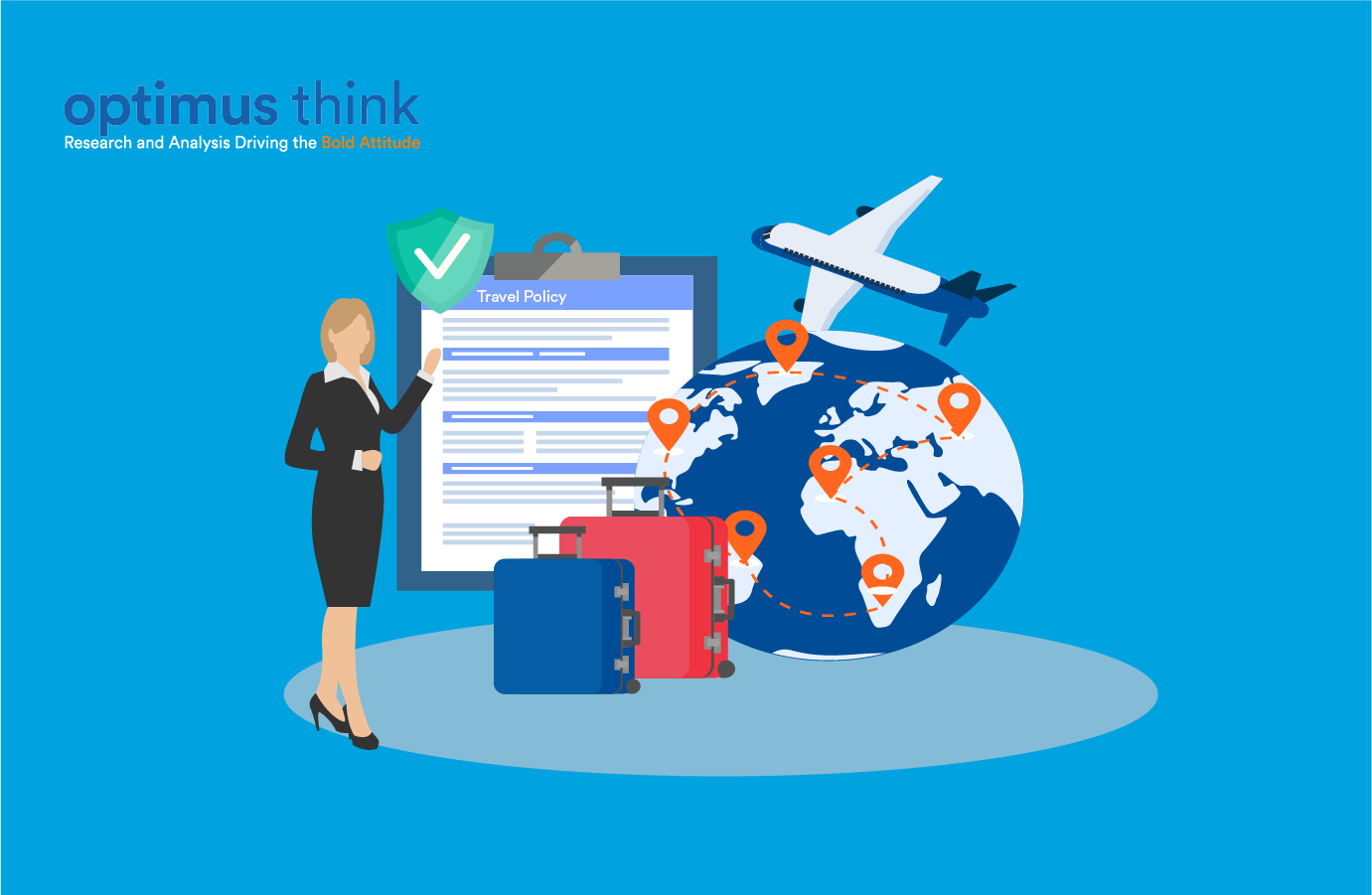How do you solve a problem like corporate travel in the era of COVID-19? This is the question leaders have been grappling with since the early days of the pandemic. As opportunities for corporate travel gradually open around the world, and airlines move to reduce social distancing measures, organizations need to reassess how they re-launch critical corporate travel activities. This includes updating their understanding of the business case for travel, developing new travel policies that emphasize employee safety, and determining how to optimize travel expense in a dramatically altered supplier landscape. These are challenges that existed before the global shutdown, however they have been further complicated because of it. So, where does one begin?
Where are We? The Current Reality
While almost every sector of the economy has experienced dramatic effects of the pandemic, few have been hit as hard as the travel sector. COVID-19 brought business travel to a halt. As of March, 95% of all North American corporate travel had been cancelled or suspended, resulting in $27.6 billion in lost monthly revenues across the supply chain.[1] While strict travel restrictions are expected to ease over the coming months, suppressed levels of demand are anticipated to continue for the majority of 2021, at only 50% of 2019 volumes.[2]
In response, the travel supply chain has ramped up its focus on traveller health, safety, and education. However, corporate travel remains difficult for most organizations to contemplate. People, and the organizations they work for, have trouble gauging the risks associated with travel, to the point where approximately 60% of people would be unwilling to travel in any capacity over the next 3-6 months, according to a recent survey.[3]
It is not just that people don’t want to travel. COVID-19 has triggered an evolution on how we work and that people may not need to travel as much as they used to as corporate norms change. At this point, however it is anybody’s guess as to how permanent changes in corporate travel cultures will be. Google, Facebook, Microsoft and many other organizations outside of the tech sector have gone virtual in a way few would have imagined a few months ago. Many have extended work from home policies for most staff into 2021, which is also because of virtual meeting technologies that have reduced the need for travel.
While we expect corporate travel in North America to rebound, the ultimate question is when. What we do know however, is that corporate travel will not look or feel the same as it did before, and this new normal will reverberate for years to come.
Where are We Going? It’s Time to Rethink Corporate Travel
Just as travel suppliers are implementing new processes and protocols to rebuild demand, leaders need to rebuild the foundational policies that will guide future travel activities. How? By bringing the corporate travel conversation into the boardroom. Corporate travel has probably never had the attention it deserves, but that needs to change.
For organizations just starting the conversation around the future of corporate travel, or those yet to embark, there are a few important areas to consider in preparing for a different future:
1. Reconsidering the Business Case for Travel
The business case for travel will need to evolve substantially in most organizations, through a renewed emphasis on demand management and understanding what goes into it and adapting it to our current reality:
Demand Management Framework

From assessing the value of travel, to the selection of the suppliers’ employees travel with, organizations will need to manage future travel demand by updating their business case and supporting policies to consider the key areas above, all while being more rigorous and considerate of the employee. Implementing policy revisions that reflect these concerns will require discussions and collaboration between the right internal (senior leadership, procurement leads, and travel managers) and external (travel management companies, consultants, and travel suppliers) stakeholders.
2. Compliance Under New Parameters
Once organizational guidelines around travel have been established, monitoring and enforcing them effectively becomes paramount. COVID-19 has raised the stakes for employee safety, and as such, a thoughtful approach to travel compliance has become even more essential. Enhanced pre-trip and post-trip compliance measures and the approach to managing unauthorized spending or out-of-policy bookings are just some of the key areas that will need to be adapted to fit a new set of travel guidelines. For those employees who are uncomfortable or unable or travel, organizations should identify and promote alterative solutions (e.g., virtual/hybrid meeting options) to accommodate them.
On the bright side, there are likely to be many benefits from all this effort on compliance: greater management of risk, controls, cost containment, as well as enhanced traveller safety and employee satisfaction.
3. Protecting your People
As employees adjust to a different future, accepting new or revised corporate travel guidelines may be a gradual process. Organizational leaders should plan to effectively manage a diverse set of preferences that employees will possess once corporate travel activities resume. Evidence suggests that before travelling, employees will want greater control over where they go and who they travel with. Destinations with greater access to healthcare and reputable travel brands with more rigorous safety protocols are expected to be the top drivers of acceptance.[4]
Once travelling, organizations should ensure that their people have all the necessary tools and public health resources available to them to help with physical and mental health, such as ‘on demand’ virtual healthcare.[5] Open communication forums for travellers to ask questions and provide comments – whether mid-trip or upon their return – are another way organizations can keep employees engaged and satisfied.
4. Travel Sourcing for a Different Future
Relationships between organizations and travel suppliers will be more important than ever, as new and existing partnerships may need to be re-evaluated for ‘fit’.[5] Organizations will need to reassess their existing standards for preferred travel suppliers and consider creating a ‘checklist’ to assess suppliers against these new standards. For example, the current environment may lend itself to an employee or company preference for higher-end suppliers, whose services go the extra mile to ensure enhanced levels of cleanliness and traveller comfort. Once preferred suppliers are reselected, organizations should then devise and deploy strategies that will direct travellers to them.
In addition, preferred travel supplier contracts, and how they are developed, should evolve in the new environment. Organizations may look to create additional flexibility in their supplier contracts based on new expectations. For instance, organizations may choose to limit risk exposure on minimum volume thresholds that may have existed previously. Overall, organizations will need to find new ways to balance the cost of upholding a higher standard of care, and the need for greater contractual flexibility for the safety and well-being of their employees.
A Final Thought
COVID-19 has changed the game for corporate travel. For organizations that have treated it as a cost centre to be managed and little more, the level and nature of decisions have changed, and it has become a mission-critical question for organizations who rely on travel to sell and deliver business. While information and directions are changing almost daily, leaders can start taking a critical look at what travel will look like in a post-COVID world. These conversations need to begin now so that organizations can be prepared to start solving a problem like corporate travel in the era of COVID-19.
Optimus SBR’s Travel Practice
Optimus SBR is an implementation-focused firm which supports a variety of clients across the broader travel supply chain from direct travel clients, to travel management companies and meetings & events companies. Our engagements focus on adding value to client organizations through solutions that are practical and implementable, allowing for the continuous generation of value, optimal operations, and high impact results. We offer a full range of strategy, operations, travel, and events and meetings consulting services, to help clients overcome challenges, and assess opportunities in a balanced and thoughtful manner, in support of reaching your economic and non-economic goals. Our work focuses on four core categories including; Strategy and Operations, Travel and Events Policy, Air/Hotel Sourcing and Program Management, and Outsourced and In-sourced Travel Services.
If you found this helpful, give us a call, or send us a note.
Brad Ferguson, SVP, Industries and Government Practice
Brad.Ferguson@optimusssbr.com
416.649.9184
James Lowe, Director
James.Lowe@optimussbr.com
[1] Global Business Travel Association, 2020 Coronavirus Poll, April 2020
[2] Business Travel News, April 2020
[3] Traveling and Entertainment in 2020 Amid COVID-19, TheVacationer.com, May 2020
[4] SAP Concur: Global Business Traveler Report 2020
[5] Ultimate Guide to When Travel Returns, Travel and Transport Inc., 2020

Optimus SBR Celebrates 6 Consecutive Wins as 2024 Best Workplaces™ in Professional Services
Our commitment to a people-first approach has been central to being recognized in 2024 for the sixth time as one of the Best Workplaces™ in Professional Services and the key to our overall success.

12 Best Practices to Increase Cross-Team Collaboration and Enhance Organizational Alignment
Enhancing cross-team collaboration drives innovation, optimizes resources, improves overall performance, and ensures every part of your organization works toward the same goals.

Enhancing Your Data Strategy for Success: The Power of Metadata
Metadata goes beyond just aiding in data retrieval. It ensures your data is secure, compliant and, most importantly, understood consistently by everyone in the organization.

Optimizing Language Translation Strategies: Beyond Compliance to Enhanced Operational Efficiency
The introduction of Quebec’s Bill 96 in Canada underscores the necessity for comprehensive translation strategies. Integrating machine translation technologies helps meet regulatory requirements while enhancing translation speed, cost efficiency, and operational effectiveness.

How to Manage Gen Z: 16 Strategies to Engage and Retain Young Talent
These practical strategies lead to a workplace that is better aligned with the values and expectations of Gen Z employees, ensuring that your efforts to attract and retain Gen Z talent are both successful and sustainable.

How to Measure the Success of Learning and Development: 12 Important Metrics to Evaluate
Quantifying the success of L&D training programs can be challenging. Learn about selecting and measuring the right metrics to determine whether your training efforts are truly making an impact.



